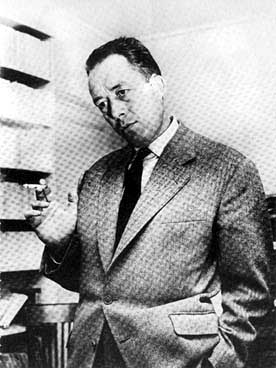
![]()
Principal Works:
The Stranger (1946)
In the story of an ordinary man who unwittingly gets drawn into a senseless
murder on a sun-drenched Algerian beach, Camus was exploring what he termed "the nakedness of man faced with the absurd."
The Plague (1948)
A parable of the highest order, The Plague tells the story of a terrible
disease that descends upon Oran, Algiers, in a year unknown. After rats
crawl from the sewer to die in the streets, people soon begin perishing
from terrible afflictions. How the main
characters in the book--a journalist, a doctor and a priest--face humanity
in the wake of the plague presents one of the book's many lessons. The book deserves
to be read on several levels, because the pandemic in The Plague represents
any of a number of worldwide catastrophes--both past and future--and the difficult
choices everyone must make to survive them.
The Rebel (1954)
The Myth of Sisyphus and Other Essays
(1955)
The Fall (1957)
In a shady bar in Amsterdam, the man who does the talking in The Fall
is indulging in a calculated confession. He recalls his past life as a Parisian lawyer,
a pleader of noble causes, secure in his self esteem, privately a libertine, yet apparently
immune to judgment. The irony of the recital predicts the downfall. Inescapable,
it comes in the narrator's intense discovery, in the space of one terrible and unforgettable
instant, that no man is innocent and no man therefore judge others from a standpoint
of righteousness.
Caligula (1938)
The Misunderstanding (Le Malentendu) (1943)
State of Siege (L'État de siège)
The Just Assassins (Les Justes)
Exile and the Kingdom (1958)
The Possessed (1960)
Resistance, Rebellion, and Death (1961)
Notebooks 1935-1942 (1963)
Notebooks 1942-1951 (1965)
Lyrical and Critical Essays (1968)
A Happy Death (1972)
Through young Patrice, the protagonist, the reader
feels in touch with the young Camus--his joy in the sea, sun, his native Algeria, his relationships
with women, his need of them and detachment from them, the intense alienation he experienced
as a traveler in Central Europe. And it is from his early intimations of death,
movingly evoked, that the novel draws its theme--how one is to live in order to
have the right death.
The First Man (1995)
"All honor to Catherine Camus for offering
us this invaluable glimpse into the life and art of a writer who may have been greater than we knew then or can know
even now." Camus' unfinished novel, found in the wreckage of the car crash
in which its Nobel Prize-winning author perished in 1960, has finally made its way
to readers. An autobiographical novel, it is generally thought that had he lived, Camus,
an intensely private man, would have revised the novel to reveal less of himself, about
which Newsweek says, "The ironic bright spot in the otherwise tragic circumstances
of his death is that he never got the chance. The First Man, incomplete and raw,
is fine just the way it is."
(Courtesy of Sam Gallagher)